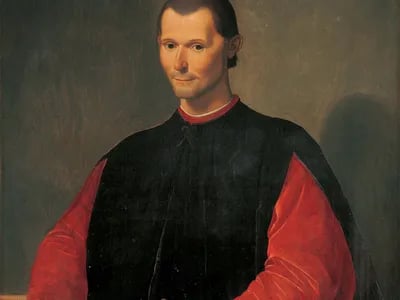UPSC Optional PSIR: Critically examine Machiavelli's views on religion and politics. (15M – 2018)
UPSC PSIR | Political Theory | Renaissance & Modernity | GS2 Ethics Linkage
PSIR
8/3/20252 min read


“The entire Renaissance was in the writings of Machiavelli.” – Harold Laski
Niccolò Machiavelli, an iconic figure of the Renaissance, is widely remembered for his groundbreaking political treatise The Prince. His ideas, often seen as cynical or even immoral, actually laid the foundation for modern secular political thought. He boldly separated politics from religion—making him one of the earliest thinkers to propose secularism as essential to practical governance.
🏛️ Renaissance Realism: Religion within the State, Not Above It
Machiavelli was a product of the Renaissance, a period marked by a break from religious dogma and the birth of rational, human-centered inquiry.
He redefined the role of religion, not as a divine authority above the state, but as a tool under the control of the state.
While he acknowledged its utility in shaping obedience, fear, and discipline, religion was never an end in itself—only a means to sustain law, order, and political stability.
📍 “Civic religion” for Machiavelli should inspire respect for laws and leaders, not act as a barrier to power or statecraft.
🛐 Utilitarian View of Religion
Machiavelli's treatment of religion was largely utilitarian:
In his Discourses on Livy, he praised the Roman Republic for its use of religion to instill communal values and discipline.
He argued that rulers should use religion strategically—to bind people, build unity, and maintain control.
📌 Real-life Parallel: Just like Ashoka used Dhamma in ancient India to promote social order, modern India uses Buddhism as soft power to build diplomatic ties with Sri Lanka, Japan, and Nepal.
✝️ Critique of the Catholic Church
Machiavelli was openly hostile to the Catholic Church:
He condemned its political interference and moral corruption.
He believed Christian values like humility, charity, renunciation, and patience weakened the military and political strength of a state.
He saw Christianity as promoting passivity, in contrast to the assertive “virtù” (strength, boldness, adaptability) he valued in rulers.
🔎 Yet, he did not reject all Christian morality—he retained basic ideas of justice, order, and loyalty but always placed political necessity over moral idealism.
⚖️ Machiavelli’s Legacy & Criticism
✅ Contributions:
First political thinker to secularize politics.
Saw religion as a sociopolitical force, not a metaphysical one.
Precursor to modern thinkers like Rousseau and Marx, who also saw religion as a coercive or ideological tool.
❌ Criticism:
Accused of being immoral, reducing religion to a political weapon.
Ignored emotional and spiritual importance of religion to common people.
Appears to endorse ends justifying the means, a sharp contrast to thinkers like Aristotle or Gandhi, who stressed moral virtue.
🧭 Conclusion: Politics Enters the Modern Age
Despite the controversies, Machiavelli’s analysis was sharp and prophetic. His critique of the Church anticipated the Reformation, and his ideas helped usher in modern political thought, where reason, power, and statecraft took precedence over theological dogma.
He liberated politics from the “vassalage of religion” and set the tone for a realist, secular, and pragmatic understanding of power—a legacy still echoed in today’s political analysis.